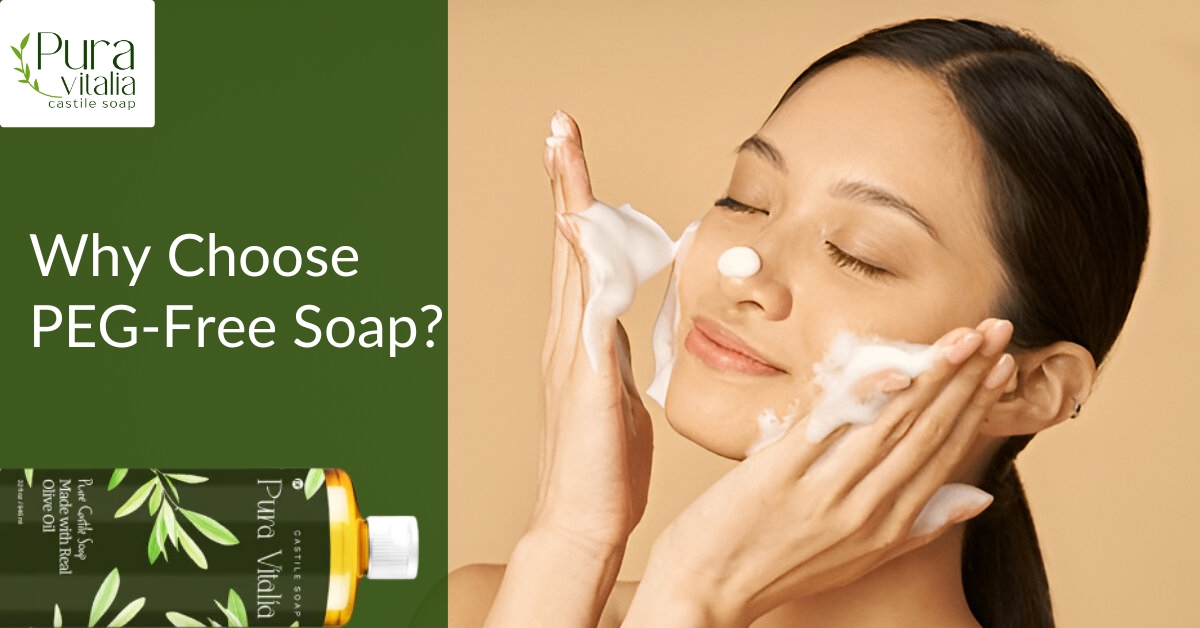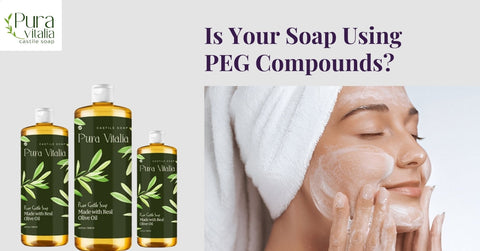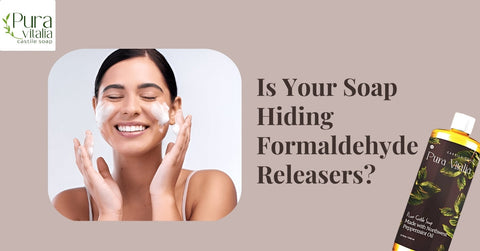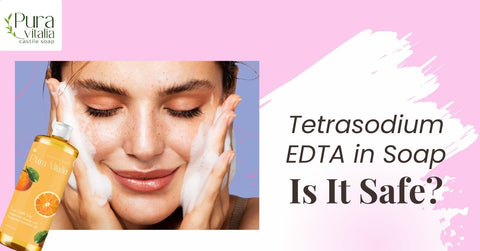Smelling bright and appearing clean, your soap allegedly does a good job of cleaning your skin. However, could it secretly harm health? Most soaps undoubtedly contain PEGs (polyethylene glycol), chemical surfactants, generally most times contaminated with poisons that suspend hormones. Pura Vitalia’s toxic-ingredient-free castile soap cleanses only using plant-based ingredients that are safe for the body, dishes, pets, and home—without risky PEGs in soaps.
What Are PEG Compounds in Soap?
PEG compounds are synthetic (petroleum-derived) chemicals known as polyethylene glycols. They're commonly used supplements for soaps, shampoos, and household cleaners, and act primarily as thickeners, emulsifiers, or surfactants. The chemicals function by mixing oil and water so as to froth lather. They contaminate the leftover 1,4-dioxane and ethylene oxide, substances classed as potential carcinogens and hormone disruptors by agencies like the EPA and IARC in their production.
Why Are PEGs in Soap a Concern?
PEGs are themselves not hazardous; however, red flags in some cases can be raised due to contamination occurring during manufacturing. For instance, ethylene oxide, a pungent odor, used to synthesize PEGs, has been linked to breast cancer and thyroid disorders in women. Such accumulation happens over time, even from low concentrations in soap; mostly, accumulation happens due to everyday use. Besides, PEGs rob the skin of its natural oils, resulting in dryness and irritation, especially for people suffering from conditions like sensitive skin and eczema.
4 Ways PEG in Soap May Impact Hormones
1. Contaminants Disrupt Hormone Balance
The 1,4-dioxane found in PEGs is a known endocrine disruptor. It mimics estrogen, a hormone critical for reproductive health, metabolism, and mood regulation. Animal studies show that prolonged exposure to 1,4-dioxane can alter estrogen levels, potentially affecting fertility and increasing risks of hormone-related cancers. While human studies are limited, the European Chemicals Agency lists it as a Substance of Very High Concern.
2. Increases Absorption of Harmful Chemicals
PEGs weaken the skin’s lipid barrier, which acts as a protective shield. This allows other toxic soap ingredients, like parabens, phthalates, or synthetic fragrances, to penetrate deeper into the bloodstream. For instance, sodium laureth sulfate (SLES), a common chemical surfactant containing PEGs, is often contaminated with 1,4-dioxane and enhances the absorption of harmful additives.
3. Linked to Reproductive Risks
Ethylene oxide, a byproduct of PEG production, is linked to reduced sperm quality and ovarian dysfunction in animal studies. While direct evidence in humans is scarce, the CDC warns that occupational exposure to ethylene oxide raises cancer risks. For everyday users, even low-level exposure through soap could pose long-term reproductive health concerns.
4. Environmental Hormone Pollution
PEGs don’t break down easily in water. When washed down drains, they enter waterways and accumulate in aquatic ecosystems. Fish and other marine life absorb these chemicals, which can disrupt their hormone systems. Over time, this pollution enters the food chain, indirectly affecting human health through contaminated seafood or water supplies.
How to Spot PEG Compounds in Soap

Check the Ingredient List
Look for terms like:
-
Polyethylene glycol (PEG followed by a number, e.g., PEG-40)
-
PPG (polypropylene glycol)
-
Chemicals ending in “-eth” (e.g., sodium laureth sulfate)
These chemical surfactants often contain PEG derivatives. For example, a label listing “PEG-100 stearate” or “ceteareth-20” indicates PEG use.
Why “Natural” Labels Can Be Misleading
Terms like “natural” or “eco-friendly” aren’t regulated. Some brands market products as “green” but still use PEGs to improve texture or shelf life. Always verify the ingredient list instead of relying on front-label claims.
Why Choose PEG-Free Soap?

Pura Vitalia’s castile soap skips PEG compounds and synthetic additives. Made with olive oil, coconut oil, and water, it cleans effectively without compromising health. Here’s why it stands out:
-
Gentle on Skin: Free of chemical surfactants, it retains the skin’s natural moisture, making it ideal for eczema-prone skin. Our unscented castile soap avoids synthetic fragrances that trigger allergies.
-
Versatile: Use it for dishes, laundry, pet grooming, or washing fruits and vegetables.
-
Eco-Friendly: Biodegradable ingredients ensure it won’t harm waterways or aquatic life.
FAQs About PEG in Soap
1. What Are PEG Compounds in Soap?
PEGs are petroleum compounds mainly used in thickening and softening products such as soaps. With the production process in course, there is a possibility of getting contaminated with 1,4-dioxane, making it toxic for hormone disruption and cancer risk.
2. Are PEGs Safe in Soap?
Definitely not. PEGs have varying degrees of toxicity, but their contaminants, like 1,4-dioxane and ethylene oxide, are dangerous. The European Union bans ethylene oxide in cosmetics, while U.S. regulations allow trace amounts, making PEGs hazardous in consumer products.
3. Why Do Companies Use PEGs in Soap?
PEGs are inexpensive, stabilize formulations, and provide creaminess to lather. For mass-produced soaps, shelf life is an important aspect as it saves costs.
4. Can PEGs Irritate the Skin?
Yes. PEGs remove natural oils from skin and can cause dryness, redness, and cracking. Those with sensitive skin or conditions like eczema or psoriasis should stay away from products containing PEGs.
5. Are PEGs Harmful to the Environment?
Yes. It has a low rate of biodegradation, thus contaminating waterways that harm aquatic life. PEG may absorb other toxins, thus increasing the overall risk to the ecosystem.
6. How Can I Check If My Soap Has PEGs?
Look for "PEG", "PPG", or terms ending with "-eth" on the labels. For instance, "PEG-100" and "sodium laureth sulfate" are indications of PEG use.
7. What Are PEG-Free Soap Alternatives?
Plant-based soaps such as Pura Vitalia's castile soap are good alternatives. Ingredients like olive oil clean powerfully without chemical surfactants or synthetic preservatives.
Change Today for Safer Cleaning
PEG in soap is one of many hidden risks. Conventional cleansers often contain toxic soap ingredients that harm health and ecosystems. Pura Vitalia’s castile soap offers a plant-based alternative for dishes, laundry, pets, and sensitive skin. Our unscented castile soap skips PEGs, parabens, and synthetic fragrances—ideal for eczema relief.
Protect your health and the planet! Try Pura Vitalia’s PEG-free castile soap today for safer, eco-friendly cleaning.



